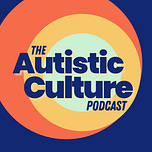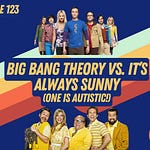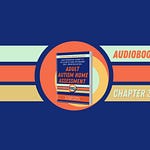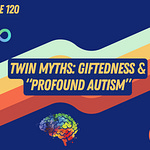An episode that plays around with the rules!
Here’s what’s in store for today’s episode:
Our hosts, Matt and Angela, kick off the episode by discussing the current state of the world, the chaos surrounding it, and how they navigate through it.
We discuss the importance of community and ongoing advocacy, emphasizing the need to stay strong and keep pushing forward for autistic children.
Our special guest, Meghan Ashley, LPC-S, is an autistic licensed professional counselor and the author of Blueprint to Behavior, a practical guide for parents looking to better understand their autistic children’s communication and needs.
Meghan's supervisory practice is neurodivergence-affirming, and she teaches clinicians worldwide about autism assessment.
We discuss the importance of having a secure accommodation plan after a diagnosis and how receiving a diagnosis means doing the necessary work to care for yourself in order to live your best autistic life.
Matt shares the unfortunate experience his son had with his autism diagnosis and emphasizes the need for the diagnostic process to evolve into a more comprehensive and supportive experience.
Meghan's mission is to ensure that this is the last generation of autistic kids whose parents feel lost or unsure about how to understand and support them.
We discuss Meghan's experience delivering a TED Talk, where she passionately shared her mission to change the landscape of autism understanding and support. She reflects on the impact of her message, emphasizing the urgent need to equip parents with the knowledge and resources to better support their autistic children.
Meghan shares the overwhelmingly positive response her TED Talk received within the autism community, highlighting how her message resonated deeply with both parents and autistic individuals. She reflects on how especially meaningful it was to hear that an autistic audience member felt affirmed and seen through her words.
We discussed TED Talk preparation with Meghan and how, in true autistic fashion, she was the only speaker that day who opted to forgo a coach, choosing instead to craft and deliver her talk entirely on her own.
Our hosts chat with Meghan about her book, Blueprint to Behavior, and dive into the experiences of neurodivergent parents—many of whom may not even recognize their own neurodivergence while navigating parenthood.
Meghan's book embraces the theme that autistic kids are whole just as they are, emphasizing that parents must take the time to truly understand their children's wants and needs rather than trying to change them.
Themes in Meghan's book include showing grace as a parent of an autistic child, while also maintaining accountability. It focuses on how to parent and love your autistic child in the best way possible, honoring their individuality and unique needs.
Meghan and our hosts discuss the impact of autistic parenting styles, with Meghan describing it as, "your house is chaotic until you figure out what you need it to do for you." She emphasizes how, for neurodivergent parents, creating a home environment that works for everyone often involves trial and error, but ultimately leads to a more harmonious and supportive space.
We discuss how internalized ableism can play a role in this process, acknowledging that neurodivergent parents may sometimes struggle with societal expectations or their own preconceived notions about what "normal" parenting should look like. This internalized ableism can impact how they approach both their own needs and those of their autistic children.
The target audience for Meghan's book is parents who believe that ABA is the only effective route for their child. Meghan encourages them to explore alternative approaches that honor their child's autonomy, emphasizing that there are other, more respectful methods to support their child's growth and well-being.
We talk about how to better understand your kids' sensory needs, especially when they don’t yet have the language to express them. Meghan emphasizes the importance of observing behaviors and triggers, and learning to interpret nonverbal cues to meet their sensory requirements effectively.
As autistic people who are late diagnosed, sometimes we find ourselves needing to parent both our autistic child and ourselves. Meghan discusses how this dual responsibility can be challenging, but also a path to greater self-understanding, self-compassion, and the ability to better support our children.
Meghan's autism assessment process involves a deeply reflective approach, where individuals bring in childhood photos of themselves, especially ones with their special interest. She encourages apologizing to your younger self for any past misunderstandings and thanking them for helping you get to where you are now. From there, Meghan guides individuals to let go of past struggles and learn coping skills that allow them to live authentically.
As an autistic person, it's important to always have your accommodations present wherever you go. Whether it’s sensory tools, communication aids, or strategies for self-regulation, having these supports readily available helps ensure you can navigate the world in a way that honors your needs and promotes your well-being.
We have to adapt to a mostly neurotypical world while also accommodating ourselves and our children. Despite the challenges, we're going to live and thrive, whether society wants us to or not. It's about asserting our place and creating spaces where we and our children can be fully ourselves.
Finally, we discuss Meghan's experience being Black and autistic in America, and how this adds unique layers to her advocacy work. She highlights the extra challenges Black autistic children face, especially when it comes to safety, and how the traditional ABA approach can be particularly predatory to the Black autistic community. Meghan stresses the importance of culturally competent support and the need to advocate for alternative, more respectful approaches.
Meghan Ashley, LPC-S (She/Her) is a Licensed Professional Counselor Supervisor in Texas. She prides herself on providing a space where people can be their full selves and explore who they are destined to become. Meghan focuses on empowering people to understand their own beliefs, thoughts, and actions to help them to learn to better understand themselves.
Meghan received her Master of Science in Counseling psychology from Louisiana State University Shreveport. Throughout her career Meghan has worked with clients identifying, celebrating, and maintaining their authenticity. Working with Autistic adults has been Meghan’s passion from the beginning.
Outside of therapy, Meghan loves photography, reading historical fiction, designing t-shirts and exploring cities with her family. If you catch her at a stoplight, she is most likely rocking out to a Disney movie soundtrack. Meghan values the psychology of different cultures and studies life like the forever student she hopes to always be.
Book link and synopsis:
Blueprint to Behavior is a book rich with practical answers to the question "what is my Autistic child communicating to me with their behaviors?". From the worksheets to the enriching examples, this book covers the spectrum on an everyday at-home vibe of how Autism presents and needs to be cared for. Meghan Ashley, MSCP, LPC-S serves as a fountain of parental knowledge perfectly blended with therapeutic expertise which shines a light on rarely talked about Autistic family dynamics. This book is for you if you want to take the guess work out of figuring out your child's wants and needs and instead have tools to know how to parent an Autistic child. Autistic people have a different way of thinking, expressing, and processing information from the world around them. They need a different way of parenting that matches their unique worldview and needs.
“That is the purpose of all this bombardment - to disrupt us, to disrupt communities, to disrupt functioning so that people can’t formulate a way to stand up for themselves, because it’s much easier to control people if you don’t have community. If you disrupt community, if you disrupt basic human rights, it’s much easier to control people.” - Matt
“[When you get an autism diagnosis], choirs of angels don’t show up on your doorstep when you get home. You actually have to do something with the diagnosis. You don’t get a prescription.” - Angela
“I absolutely don’t say you should be more normal. You should be more autistic is what I say. If the world was more autistic, then things would probably run better, and it wouldn’t be as, you know, *dumpster fire*.” - Meghan Ashley, LPC-S
“[Having gone through therapy school], we are not taught anything about learning about autistic people or how to address autistic family issues, because we’re taught about neurotypical families. We’re taught about how to establish these neurotypical hierarchies and triangles and all this other stuff. But everything I’ve learned about autism comes from other autistic people, comes from my own experience as a therapist, my own experience as a father, my own experience working with autistic people.” - Matt
“As an autistic person, you take my experience as fact and that’s it. It’s not up for debate.” - Meghan Ashley, LPC-S
“When I do my assessments, I have my clients bring in pictures of them when they were kids, pictures of them with their special interests and all of these amazing ways that have made up this entire human who is an autistic person. And we apologize to that baby, because nobody knew. Nobody knew how to help them. They found these coping skills that sometimes work, sometimes don’t, that got them to where they are today. And then, we let that go. Because now, we’re in a different place where we can figure out what we actually want and need. And we can actually live more authentically and artistically and happily in this space.” - Meghan Ashley, LPC-S
Did you enjoy this episode? Our special guest, Meghan Ashley, shares her insights on parenting autistic children and embracing neurodivergence. We explore the challenges of understanding sensory needs, creating accommodations, and how to live authentically as neurodivergent individuals. Meghan also reflects on her experience as a Black autistic person in America and the importance of safe, respectful support for Black autistic children. In the comments, let us know what resonated with you, and use #AutisticCultureCatch to share your thoughts on social media and connect with other listeners!
Show Notes:
https://www.instagram.com/mperfectconsulting/
Ted Talk:
Book: https://www.amazon.co.uk/Blueprint-Behavior-Adapting-Understanding-Behaviors/dp/B0D83L3MJY
ToolKits:
Related Episodes:
Child-to-Parent Diagnostic Pipeline
Follow us on Instagram
Find us on Apple Podcasts and Spotify
Learn more about Matt at Matt Lowry, LPP
Join Matt’s Autistic Connections Facebook Group
Learn more about Angela at AngelaKingdon.com
Angela’s social media: Twitter and TikTok
Our Autism-affirming merch shop















Share this post